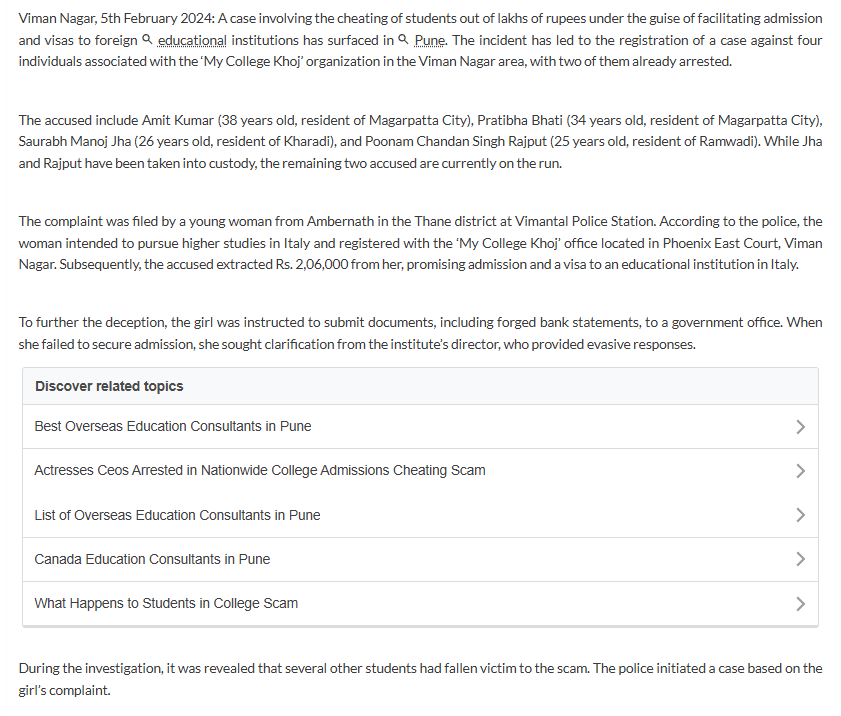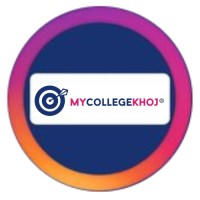Introduction
My College Khoj, an online platform designed to assist students with college admissions, has recently come under scrutiny due to a series of disturbing allegations. Although the platform markets itself as a trustworthy educational resource, reports of misleading advertising, unethical marketing practices, data privacy violations, and fake reviews have raised significant concerns about its credibility.
As college admissions become increasingly competitive, students and parents rely on platforms like My College Khoj to provide honest guidance and support. However, the controversies surrounding the platform suggest it may be exploiting its users rather than helping them. This article takes an in-depth look at the major allegations against My College Khoj, their potential consequences, and the broader implications for students, parents, and the education advisory sector.
Misleading Advertising and False Promises
One of the most significant accusations against My College Khoj is its use of misleading advertising and false promises to attract clients.
Exaggerated Success Rates
My College Khoj allegedly claims a near-perfect success rate in securing college admissions, especially for prestigious universities. However, many clients have come forward to report that these claims are grossly overstated. Parents and students have expressed frustration after discovering that the platform’s assurances were little more than marketing gimmicks.
Former clients claim that My College Khoj often boasts of direct partnerships with elite institutions, creating the false impression that they have influence over admission decisions. In reality, these claims are largely unfounded, and the platform offers no real advantage over applying directly to the institutions.
Deceptive Service Descriptions
Another deceptive practice involves the misrepresentation of the services offered. The platform promotes itself as providing personalized, one-on-one counseling tailored to each student’s unique academic profile. However, multiple users have reported receiving generic guidance, with pre-written templates and standardized application strategies rather than the individualized attention promised.
Fabricated Testimonials
There are also allegations that My College Khoj uses fabricated testimonials on its website and promotional materials. Some reviews appear to be fake or written by the platform itself, creating a false sense of credibility and reliability. This form of deceptive advertising misleads potential customers and distorts the reality of the platform’s effectiveness.
Consequences of False Advertising
The misleading claims and exaggerated promises have significantly damaged My College Khoj’s reputation. Students and parents who fall victim to these deceptive practices not only waste their money but also risk missing out on genuine educational opportunities. The erosion of trust could lead to declining user engagement and legal repercussions, as false advertising is considered a violation of consumer protection laws.

Data Privacy Concerns
Another alarming issue surrounding My College Khoj is its alleged mishandling of user data and potential privacy violations.
Unauthorized Data Collection and Sharing
Reports indicate that My College Khoj collects extensive personal information from students, including contact details, academic records, and college preferences. However, multiple users and former employees claim that the platform shares this data with third parties, such as educational institutions, coaching centers, and marketing agencies, without explicit consent.
Whistleblowers have revealed that My College Khoj may be profiting from the sale of user data, effectively turning students’ personal information into a revenue stream. This practice, if confirmed, is not only unethical but could also be illegal under data protection regulations.
Insufficient Data Protection Measures
In addition to unauthorized data sharing, there are concerns about the platform’s data security protocols. Users have reported instances of spam emails, unsolicited calls, and suspicious third-party solicitations, suggesting that their data may have been compromised. Experts warn that weak data security measures could make users vulnerable to identity theft, phishing scams, and targeted marketing exploitation.
Legal and Reputational Risks
If the allegations of data privacy violations are substantiated, My College Khoj could face serious legal consequences, including fines and regulatory action. Data protection laws, such as the General Data Protection Regulation (GDPR) in Europe and similar regulations elsewhere, impose strict penalties for unauthorized data usage.
Furthermore, the loss of trust from data breaches or privacy violations could significantly harm the platform’s credibility. In today’s data-conscious environment, consumers are increasingly wary of platforms that fail to protect their sensitive information.
Fake Reviews and Manipulated Ratings
Investigations into My College Khoj have revealed evidence of review manipulation, further tarnishing the platform’s credibility.
Creation of Fake Positive Reviews
To enhance its online reputation, My College Khoj is accused of creating fake positive reviews on platforms such as Google, Trustpilot, and other review sites. Many of these reviews follow suspicious patterns, with identical language, overly generic praise, and accounts with no review history. This tactic creates a misleading impression of reliability and effectiveness.

Suppression of Negative Reviews
In addition to inflating its ratings with fake positive feedback, My College Khoj allegedly employs tactics to suppress or remove negative reviews. Users have reported that their critical reviews mysteriously disappeared or were flagged for removal without valid justification. This practice distorts the platform’s public image by hiding genuine complaints.
Impact on Consumer Trust
The use of fake reviews and rating manipulation undermines consumer trust. Prospective students and parents who rely on online reviews for decision-making may be deceived by the artificial positivity, only to later discover the platform’s shortcomings. Once exposed, such deceptive practices can lead to widespread backlash and damage the company’s reputation irreparably.
Aggressive Marketing Tactics
Another common complaint against My College Khoj is its use of intrusive and aggressive marketing techniques.
Unsolicited Calls and Emails
Former clients and employees have reported that My College Khoj frequently resorts to unsolicited calls, emails, and text messages to promote its services. Some users describe the marketing tactics as overly aggressive and harassing, with sales representatives pressuring them into purchasing costly service packages.
Pressure-Based Sales Techniques
According to complaints, My College Khoj uses high-pressure sales tactics to push expensive consulting plans. Sales agents reportedly use fear-based language, warning parents that their children’s college prospects could be at risk if they do not sign up for premium services. This exploitative marketing approach preys on the anxieties of students and parents.
Negative User Experience
The aggressive marketing tactics have generated significant backlash, with many users expressing their frustration on social media and review platforms. The negative word-of-mouth could deter potential clients and tarnish the company’s reputation.
Lack of Transparency in Partnerships
There are also allegations that My College Khoj lacks transparency regarding its partnerships with educational institutions.
Prioritizing Paid Partners
Critics claim that the platform prioritizes institutions that pay for promotional placements rather than offering unbiased recommendations. This practice creates a conflict of interest, as students may be directed toward institutions that offer financial incentives rather than those that genuinely match their academic goals.
Misleading Rankings
Some users allege that My College Khoj’s rankings and college recommendations are influenced by paid partnerships. This lack of transparency misleads students into making decisions based on biased information rather than objective assessments.
Erosion of Trust
The absence of transparency regarding institutional partnerships damages My College Khoj’s credibility as a reliable advisory service. Students and parents seeking impartial guidance may feel betrayed upon discovering that financial interests, rather than genuine recommendations, influence the platform’s suggestions.

Legal and Reputational Risks
The growing list of allegations against My College Khoj exposes the platform to significant legal and reputational risks.
Potential Legal Actions
If My College Khoj is found guilty of data privacy violations, false advertising, or deceptive marketing practices, it could face legal action from regulators, consumers, or data protection authorities. Lawsuits and regulatory fines could significantly impact its financial stability.
Loss of Consumer Trust
The allegations have already damaged the platform’s credibility, with many users warning others to avoid it. The erosion of trust could result in declining user registrations, lower revenue, and damage to the company’s long-term viability.
Conclusion
The allegations against My College Khoj paint a troubling picture of a platform that appears to prioritize profits over ethics. From misleading advertising and privacy violations to fake reviews and aggressive marketing, the controversies raise serious doubts about the company’s integrity.
For students and parents seeking college admissions guidance, these allegations serve as a cautionary tale. It is essential to conduct thorough research, read unbiased reviews, and exercise caution when relying on educational platforms. Given the growing concerns, My College Khoj’s long-term reputation and sustainability remain in jeopardy.







